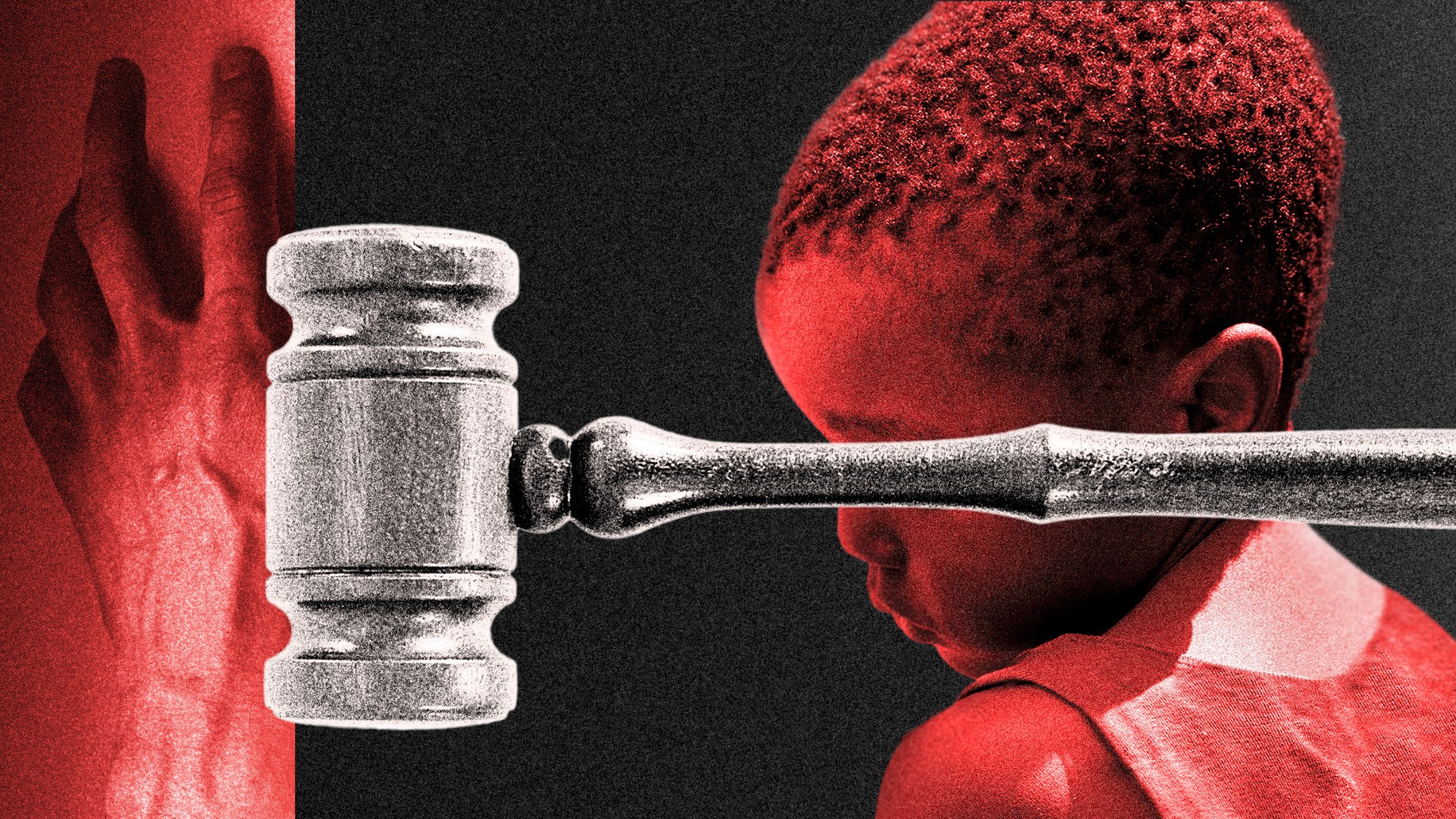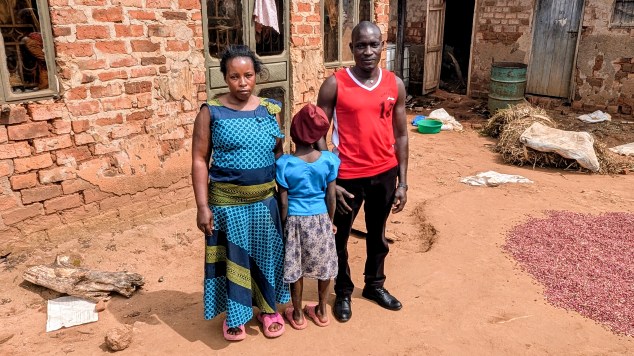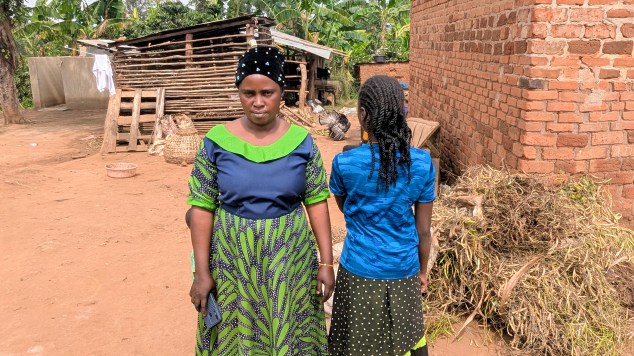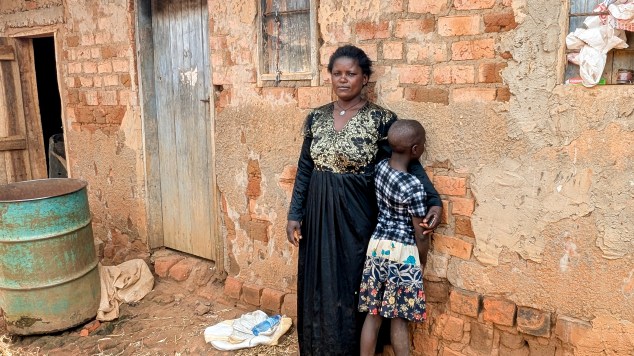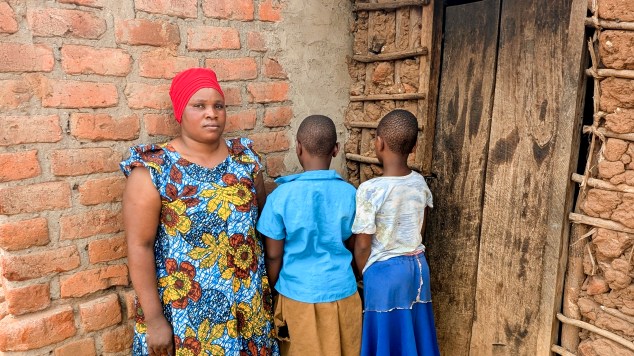On her way back from school each afternoon, six-year-old N. K. walked past acres of leafy cassava plants, corn stalks, and bushels of bananas dangling over lily-white coffee blossoms. The sun shone brightly on the fertile volcano-soil fields in Bukumbula, a village outside the southwestern Ugandan city of Masaka.
Before entering her courtyard, N. K. walked past Maalo Mohammed’s food stall selling rolexes, a popular Ugandan street food made of fried egg and a flatbread known as chapati. The 70-year-old man, better known as Jajja (grandfather) Roma, often kept an eye on the kids living in the block behind his business for a few hours until their parents came home.
N. K.’s parents were close with Maalo and trusted him. Yet unbeknownst to them, Maalo was following their daughter home, cornering her in the house or latrine, and forcing her to undress. Then he would rape N. K. Before he left, he would point a knife at her, warning her he would kill her if she reported him.
On July 17, 2023, N. K.’s mother, Namatovu Joyce, noticed discharge on her daughter’s underwear while doing laundry. N. K. had been feeling sick, and her mother was suspicious. (Because of the nature of the crimes done against the children in this story, CT is using their initials.)
Namatovu sobbed as N. K. told her that Maalo had been assaulting her. Namatovu and her husband, Sserwanja Dick, contacted the authorities. When the police arrived later that day, they asked Sserwanja for more than a month’s wages to transfer Maalo to jail and treat N. K. at the hospital. Sserwanja begrudgingly paid, and the police arrested Maalo on charges of defilement (how Uganda refers to sexual assault) and took him into custody.
Corruption is just one of numerous challenges that Uganda’s citizens face when navigating the criminal justice system. Lack of funding and personnel regularly impedes arrests, trials, and defendants’ bail and speedy-trial rights, according to interviews with ten professionals connected to Masaka’s criminal justice system.
N. K.’s family faced many of these obstacles: After the arrest, they didn’t receive any updates on a possible trial for two years. Sserwanja visited the district jail every three months to confirm authorities hadn’t released Maalo. (Desperate families may try to bribe officials.) But their determination, in tandem with the efforts of a local ministry, helped secure justice that eludes many sex abuse survivors.
In 2020, Okoa Refuge opened the first of six centers across the Masaka area to help sex abuse survivors file police reports and send their cases to the prosecutors, and to support law enforcement by offering transportation and arrest support. The day after Maalo’s arrest, a social worker from the ministry came to help fill out a police form that documented the crimes to send to the state. By then, three additional families, who all shared a courtyard with Namatovu and Sserwanja, had reported that Maalo had assaulted their daughters, whose ages ranged from five to eight.
The social worker took all five girls to a clinic to see if they had Maalo’s DNA inside them and to test them for sexually transmitted diseases. Tests confirmed that the DNA was a match and that the girls had syphilis.
As the parents tended to their daughters’ health concerns, they could do little to move the case along. The High Court, which had jurisdiction over capital punishment and life imprisonment cases, had a backlog of 1,114 cases. (Ostensibly, each of Uganda’s 135 districts should have their own court, but here 6 districts fell under the Masaka High Court.) It did not hear a single case in 2024. The regional jail held defendants who had been arrested in 2018 and had never had the opportunity to make bail.
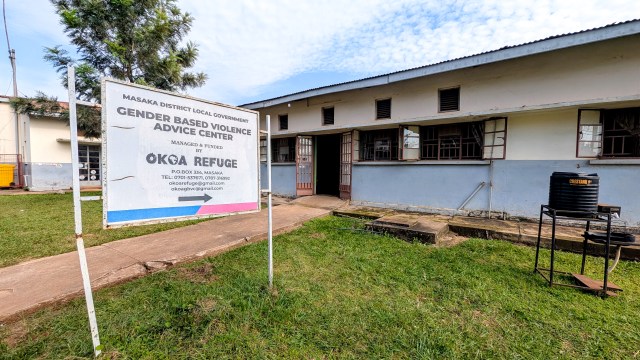 Photography by Troy McGee
Photography by Troy McGeeIn February of this year, Tyler Workman, Okoa’s CEO, ran into the outgoing High Court judge, who asked Workman if the ministry would consider underwriting a court session later that year. After deliberating with his board, Workman agreed but wanted the funding to be strategic. He and his colleagues decided the session would include cases from only a single district. The ministry also reached out to the (overcrowded) prison to ensure it would have space for up to 40 new prisoners. The ministry requested that the court hear a portion of the cases where staff at one of their centers had counseled or supported the victims.
For its part, the court decided to focus on more recent cases where it believed the victims (many of whom were children) would be more likely to remember incriminating facts and where witnesses were less likely to have moved away.
In April, a police officer came personally to the village to inform N. K., her parents, and the other three families that their case would be heard the first Wednesday of June of this year. On June 4, the families left the village at six in the morning and arrived at court at seven.
The trial commenced at two o’clock. As the families entered, an official escorted the girls away from their parents to a space with balls, puzzles, dolls, and toy cars, which the court hoped would distract the girls and calm their nerves as they prepared to testify. Still, they shook when Maalo walked in, stared at them, and waved.
“I didn’t want to see him,” said N. K. “I refused to make eye contact.”
As the trial opened, Judge Bwanika Fatuma read out the charges against Maalo. But before she could call anyone to the stand, Maalo pleaded guilty to everything.
The girls and their parents were furious. “We were ready to give him hell,” said Namatovu. When a parent in the room started crying, an official reprimanded her.
The lead investigator, the prosecutor, and the judge all later identified the case as the most emotionally disturbing of the session. At court, Nassuna Rehema, the lead investigator, cried. (“He wasn’t remorseful.”) So did the judge. Then Bwanika sentenced Maalo to 10 years, 1 month, and 23 days in prison for each girl he raped.
Maalo is now incarcerated in a prison holding more than five times its intended population.
The criminal justice system put the perpetrator away, but recovery has been tougher at the personal level. In the beginning, classmates bullied the girls for being Maalo’s “wife.” Others accused them of having HIV. (They do not.) All but one family transferred their daughters to other schools.
Still, Maalo’s family’s house sits along their school route. The empty rolex kiosk stands just steps from their home.
After Maalo’s arrest, Namatovu began coming home earlier from work. “Children are more important than money,” she said. At one point, she got so sick thinking about her daughter’s trauma she nearly went to the hospital. She has turned to prayer, asking God to give her strength and courage, and confides in her neighbors, some Muslim, some Christian, about their daughters’ challenges.
All the girls still deal with stomachaches, headaches, and leg pain. The girls need monthly treatments, which include IV injections (“They are so painful,” said N. K.), and often must stay at the clinic for three to five days at a time. The price of the treatments and the transportation to these sessions can overwhelm their families.
“Whenever I feel sick, I remember what happened, and I feel worse,” said N. R., who was five when Maalo raped her.
The girls have also realized how few victims can seek justice. Maalo’s stepson committed a sex crime against a girl around their age, but no one spoke up for her because she was related to him, the girls say.
“I want her parents to encourage her to speak up,” said N. R., “and not block her from saying what happened.”

